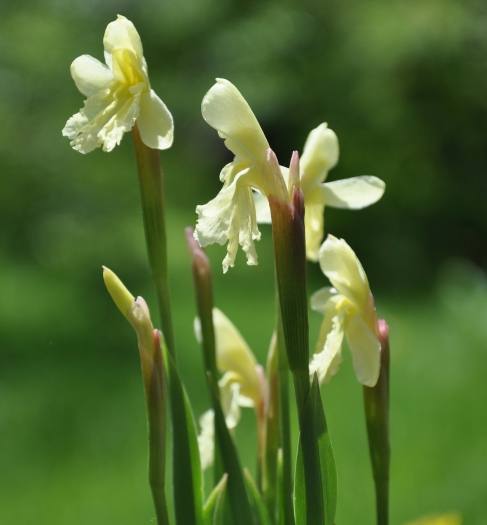Roscoea
(Roscoea cautleyoides)
Roscoea (Roscoea cautleyoides)
/
/

Roscoea_cautleoides.JPG: Secundum naturam derivative work: Peter coxhead (talk)
Public domain
Image By:
Roscoea_cautleoides.JPG: Secundum naturam derivative work: Peter coxhead (talk)
Recorded By:
Copyright:
Public domain
Copyright Notice:
Photo by: Roscoea_cautleoides.JPG: Secundum naturam derivative work: Peter coxhead (talk) | License Type: Public domain | License URL: https://creativecommons.org/public-domain/ | Uploader: Peter coxhead | Publisher: Wikimedia Commons | Title: Roscoea_cautleoides_cropped.jpg | Notes: User created page with UploadWizard |











Estimated Native Range
Summary
Roscoea cautleyoides, commonly known as Roscoea, is a deciduous perennial herb native to the mountainous regions of South-Central China, where it thrives in meadows, forest clearings, and along stream banks. It typically grows to a height and width of 1-2 feet, forming clumps of upright, lance-shaped leaves. The plant is notable for its exotic-looking flowers, which come in shades of cream, yellow, pink, purple, and white, blooming in succession from late spring to summer. These flowers are orchid-like in appearance and can be quite showy, making them a highlight in the garden during their flowering season.
Roscoea is valued for its unique flowers and is often used in borders, rock gardens, and woodland settings. It is relatively easy to maintain, requiring minimal care once established. While it prefers full sun or part shade, it is essential to protect it from the hot afternoon sun in warmer climates. The soil should be well-drained yet consistently moist, as the plant does not tolerate drought well. Roscoea is not known to have serious disease or pest problems, but it should be protected from slugs and snails, which can damage the foliage and flowers. It is not typically invasive and does not have aggressive roots, making it a safe choice for most garden settings.CC BY-SA 4.0
Roscoea is valued for its unique flowers and is often used in borders, rock gardens, and woodland settings. It is relatively easy to maintain, requiring minimal care once established. While it prefers full sun or part shade, it is essential to protect it from the hot afternoon sun in warmer climates. The soil should be well-drained yet consistently moist, as the plant does not tolerate drought well. Roscoea is not known to have serious disease or pest problems, but it should be protected from slugs and snails, which can damage the foliage and flowers. It is not typically invasive and does not have aggressive roots, making it a safe choice for most garden settings.CC BY-SA 4.0
Plant Description
- Plant Type: Herb
- Height: 1-1.5 feet
- Width: 1-1.5 feet
- Growth Rate: Moderate
- Flower Color: Yellow, Purple
- Flowering Season: Spring, Summer
- Leaf Retention: Deciduous
Growth Requirements
- Sun: Full Sun, Part Shade
- Water: Medium
- Drainage: Medium
Common Uses
Bank Stabilization, Rock Garden, Showy Flowers
Natural Habitat
Meadows, forest clearings, and stream banks in mountainous regions of South-Central China
Other Names
Common Names:
Scientific Names: , Roscoea cautleyoides, Roscoea chamaeleon, Roscoea yunnanensis, Roscoea capitata var. purpurata, Roscoea cautleyoides f. atropurpurea, Roscoea cautleyoides f. sinopurpurea, Roscoea cautleyoides var. purpurea, Roscoea sinopurpurea, Roscoea yunnanensis var. purpurata,
GBIF Accepted Name: Roscoea cautleyoides Gagnep.